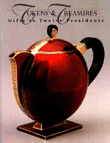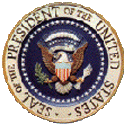|
The National Archives Presidential Libraries
|
The Presidential Library System "Tokens and Treasures" highlights the museum collections of a little-known national treasure–the Presidential Library System. Administered by the National Archives and Records Administration, the Presidential Library System holds the papers and historical materials of the most recent American Presidents, from Herbert Hoover through William J. Clinton. With more than 269 million pages of textual materials, 5 million photographs, 14 million feet of motion picture film, and 78,000 hours of audio and video recordings, the Presidential libraries are a gold mine of historical information. They are also home to hundreds of thousands of Presidential gifts–the inspiration for "Tokens and Treasures." President Franklin D. Roosevelt founded the library system in 1939 when he donated his personal and Presidential papers to the federal government. He also donated a portion of his family estate at Hyde Park, New York, for the construction of a building that would serve as both a repository for his papers and a research institution. Roosevelt firmly believed that in a free society, the official records of a Presidency should be open to public scrutiny and accessible for historical study. FDR asked the National Archives, which preserves the government's most important documents, to administer his library. With the Presidential Libraries Act of 1955, other Presidents followed Roosevelt's example and established libraries. This tradition vastly improved the fate of Presidential papers. Because a President's official documents were originally considered his personal property, pre-Hoover Presidential records were often scattered, split among public and private institutions across the country. Some suffered damage; some were lost or destroyed. The Presidential Library System ensures safe storage, the consolidation of entire collections, and ready access for researchers. When the 1978 Presidential Records Act made Presidential papers the property of the U.S. government, the library system was already in place to provide for the records' preservation. The Presidential libraries are constructed with private funds and, once completed, turned over to the National Archives for operation and maintenance. Today the system includes ten libraries and two Presidential materials projects. The Clinton Presidential Materials Project will become the William J. Clinton Presidential Center, which will include the Clinton Presidential Library when it opens in 2006. President Nixon's papers are maintained and available for research at the Nixon Presidential Materials Project at the National Archives facility at College Park, Maryland. A library for President Clinton is in the planning stages. Located in the Presidents' home states, the National Archives' Presidential libraries are a nationwide resource. They offer ready access to essential evidence of the national experience through their research facilities, educational programs, and exhibits--including their own displays of Presidential gifts. We invite you to visit each of them to learn about the Presidents, the office of the Presidency, and the open system of government that makes the libraries' existence possible.
|
||


